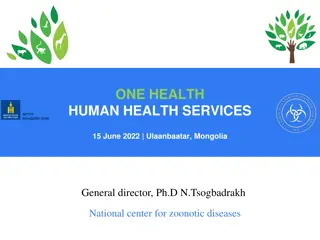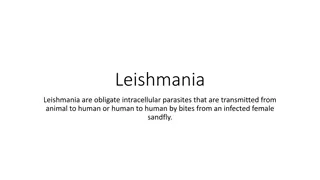Zoonotic Diseases in Mongolia: A One Health Perspective
High risk of zoonosis in Mongolia is evident due to various factors such as livestock practices, wildlife diseases, and environmental changes. The National Center for Zoonotic Diseases in Mongolia plays a crucial role in studying, preventing, and raising awareness about over 160 zoonotic infectious
0 views • 13 slides
Interconnected Health: Human, Animal, and Ecosystem - A Historical Perspective
Explore the intricate relationship between human health, animal plagues, and ecosystem well-being from 1400 to 1770 through zoonosis, epidemics, and early modern murrains. Delve into the concept of One Health, advocating for collaboration among healthcare professionals, veterinarians, and environmen
0 views • 28 slides
Understanding Parasitology: A Comprehensive Overview
Parasitology is the study of parasites, their hosts, and the interactions between them. This field explores the different aspects of parasitism, including the relationships between parasites and hosts, the classification of major parasite groups like protozoa, helminths, and arthropods, and terms cr
0 views • 16 slides
Understanding Leishmaniasis: Transmission, Symptoms, and Epidemiology
Leishmaniasis, caused by obligate intracellular parasites transmitted through infected sandfly bites, has different forms including cutaneous, mucocutaneous, and visceral. The life cycle involves promastigote and amastigote stages. Epidemiologically, it is a zoonosis with natural reservoirs and can
0 views • 14 slides



